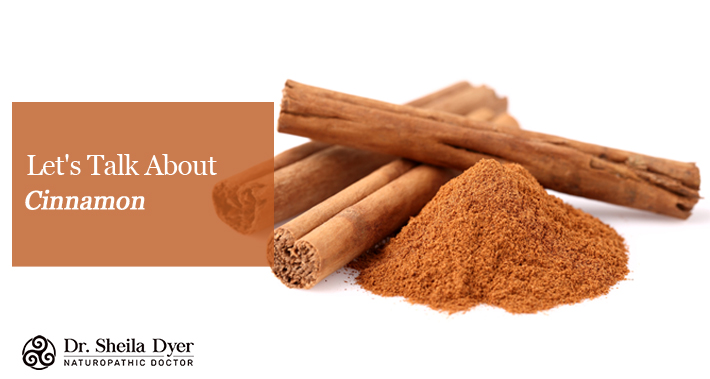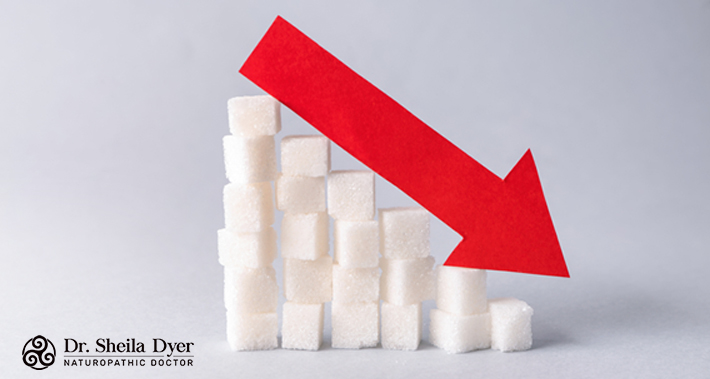You might think of cinnamon as the spice you add to your morning oatmeal or something you sprinkle on cookies, but it’s a lot more than just a delicious flavouring.
Cinnamon also has a number of health benefits and has been used for its medicinal properties by many cultures around the world for thousands of years.
As a naturopathic doctor in Toronto I want to help you explore the many health benefits of this antioxidant.
Let’s (cinnamon) roll into it.
What Is Cinnamon?
Cinnamon is a spice which is widely used for its health benefits but also adds a distinctive flavour to baking and cooking.
It comes from the bark of the cinnamomum verum tree.
It’s high in antioxidants, and has antifungal, antibacterial, and anti diabetic properties.
There are two main types of cinnamon commonly used today.
Cassia cinnamon is easier to grow and has a stronger flavour.
It’s more commonly used, as a result.
Cassia cinnamon is native to southern China, and is also called Chinese cinnamon.
As a result, it’s often used in traditional Chinese medicine, the same medicinal tradition that gives us acupuncture.
RELATED: Toronto Naturopathic Acupuncture Services Clinic Near Me
It’s also considered lower quality.
Ceylon cinnamon is more difficult to grow.
It comes from Sri Lanka and southern India.
Its flavour is more subtle, which makes it highly sought after for gourmet cooking.
If the cinnamon you have isn’t labelled, it’s probably cassia cinnamon.
What Is Cinnamaldehyde?
Cinnamaldehyde is the compound in cinnamon which gives it its distinct flavour and smell and is also thought to be the source of many health benefits.
It comes from the bark of the cinnamon tree.
The oil of cassia cinnamon is about 95% cinnamaldehyde, which is why it has a stronger flavour.
Ceylon cinnamon oil, on the other hand, is between one half and two thirds cinnamaldehyde.
Health Benefits Of Cinnamon
There are a variety of health benefits associated with cinnamon.
Let’s look at some of them now.
1. It’s A Powerful Antioxidant
Antioxidants are compounds which help protect your body against free radicals which can lead to oxidative stress.
Too much oxidative stress may contribute to diseases like cancer, type 2 diabetes, and heart disease.
Cinnamon is full of these important compounds and has been shown to increase antioxidant levels in the blood.
It can be difficult to get enough cinnamon from diet alone to make a significant impact on levels of antioxidants in the blood.
However, there are a number of other antioxidants, including:
- Vitamin A
- Vitamin C
- Vitamin E
- Coenzyme Q10
- Manganese
- Iodine
- Melatonin, a hormone that regulates your sleep cycle
- Beta carotene, which your body converts into vitamin A
- Circumin, the active ingredient in turmeric
- Capsaicin, the active ingredient in hot peppers
- Flavonoids, a category of polyphenols common in coffee and some teas
- And many more
2. It’s A Powerful Anti Inflammatory
In some situations, inflammation can be a good thing.
For instance, if you’re injured, swelling and inflammation mean your body is sending white blood cells to the affected area to repair tissue and help you heal.
When inflammation becomes chronic it can lead to damage of cells, tissues, and organs.
This can result in illnesses such as cancer, rheumatoid arthritis, and Alzheimer’s disease.
Cinnamon is full of flavonoids which have been shown to have powerful anti inflammatory properties.
This anti inflammatory property means cinnamon may also be useful in managing pain and relieving muscle soreness.
3. It Can Reduce Blood Sugar Levels
Eating cinnamon can affect the enzymes which break down carbohydrates in your digestive tract.
This results in a lowering of the amount of sugar entering your bloodstream.
Additionally, there is a compound in cinnamon which appears to act like insulin.
It helps increase the amount of sugar going into the cells, instead of staying in the bloodstream.
RELATED: Is Sugar Really As Bad For You As They Say?
4. It Helps Manage Insulin Resistance
Insulin is important for regulating metabolism, as well as transporting glucose from your bloodstream to your cells.
Insulin resistance occurs when your cells are unable to use the glucose from your blood to make the energy required to power your body.
Cinnamon may help increase sensitivity to insulin and lower insulin resistance.
RELATED: Naturopathic Solutions For Insulin Resistance
5. It May Have Anti Cancer Properties
Some compounds in cinnamon may protect against cancer.
They do this by reducing the growth of cancer cells.
They may also block certain proteins responsible for cancerous cell growth.
This is largely in part due to its antioxidant properties which we looked at earlier.
In one study on mice, cinnamon was found to lower the oxidative stress on cancer cells.
Cinnamon has also been showing to improve colon health and reduce the risk of colon cancer.
6. Other Health Benefits
We’ve only just touched the surface of the many health benefits of cinnamon.
Some other things this tasty spice can help with include:
- May protect against heart disease
- Potential benefits on neurodegenerative diseases like Parkinson’s and Alzheimer’s
- Has anti bacterial, anti viral, and anti fungal properties, and can help protect against infections
- Could provide protection against HIV
- Multiple sclerosis prevention
- Help with wound healing
- Reduce the negative effects of eating meals high in fat
- Can be used to help with digestive issues
- May protect against bad breath and tooth disease
- May improve skin health
- May reduce allergy symptoms
- Helps stop candida growth in the digestive tract
- Is a natural preservative
- Helps sweeten recipes while avoiding excess sugar
Can You Overdose On Cinnamon?
While cinnamon has a host of different benefits, there may be too much of a good thing.
Cassia cinnamon in particular is high in a compound called coumarin.
Eating too much cassia cinnamon has been linked with liver issues, mouth sores, low blood sugar, and breathing issues.
It may also interact with certain pharmaceutical medications.
In most cases, it’s best not to eat more than a teaspoonful of cinnamon per day.
This will give you the benefits, while avoiding the drawbacks.
It’s worth noting that this is only an issue with cassia cinnamon.
Ceylon cinnamon does have coumarin as well, but in much smaller quantities, so it’s much more difficult to feel the negative effects.
Book Your Appointment With Dr. Sheila Dyer, ND, Today
Are you interested in learning about how supplementing with cinnamon or other antioxidants may be able to help you?
Do you want to ensure you’re getting enough of these, and other important nutrients to keep your body in peak condition from day to day?
I’m Dr. Sheila Dyer, ND, a naturopathic doctor in Toronto, and I want to help you make sure your body is getting everything it needs.
Book an appointment today, to take the first step to becoming a healthier you.
If you have questions about naturopathic medicine, or would like to start with your first consultation, contact me, and let’s book an appointment.
Dr. Sheila Dyer, ND1080 Dovercourt Rd,
Toronto, ON M6H 2X8
(416) 554-5135
► https://g.page/DrSheilaDyerNd
Dr. Sheila Dyer is a Naturopathic Doctor and a practicing registered nurse offering holistic healthcare with a scientific focus

